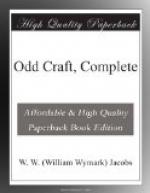Mr. Blows, who had filled the glass, set it down on the table untasted; things seemed a trifle uncanny.
“Go on,” said Mrs. Blows; “you’ve got more right to it than anybody else. Fancy ’aving you here drinking up the beer for your own funeral.”
“I don’t understand what you’re a-driving at,” retorted Mr. Blows, drinking somewhat gingerly from the glass. ’Ow could there be a funeral without me?”
“It’s all a mistake,” said the overjoyed Mrs. Blows; “we must have buried somebody else. But such a funeral, John; you would ha’ been proud if you could ha’ seen it. All Gravelton followed, nearly. There was the boys’ drum and fife band, and the Ancient Order of Camels, what you used to belong to, turned out with their brass band and banners—all the people marching four abreast and sometimes five.”
Mr. Blows’s face softened; he had no idea that he had established himself so firmly in the affections of his fellow-townsmen.
“Four mourning carriages,” continued his wife, “and the—the hearse, all covered in flowers so that you couldn’t see it ’ardly. One wreath cost two pounds.”
Mr. Blows endeavoured to conceal his gratification beneath a mask of surliness. “Waste o’ money,” he growled, and stooping to the cask drew himself an-other glass of beer.
“Some o’ the gentry sent their carriages to follow,” said Mrs. Blows, sitting down and clasping her hands in her lap.
“I know one or two that ’ad a liking for me,” said Mr. Blows, almost blushing.
“And to think that it’s all a mistake,” continued his wife. “But I thought it was you; it was dressed like you, and your cap was found near it.”
“H’m,” said Mr. Blows; “a pretty mess you’ve been and made of it. Here’s people been giving two pounds for wreaths and turning up with brass bands and banners because they thought it was me, and it’s all been wasted.”
“It wasn’t my fault,” said his wife. “Little Billy Clements came running ’ome the day you went away and said ’e’d fallen in the water, and you’d gone in and pulled ’im out. He said ’e thought you was drownded, and when you didn’t come ’ome I naturally thought so too. What else could I think?”
Mr. Blows coughed, and holding his glass up to the light regarded it with a preoccupied air.
“They dragged the river,” resumed his wife, “and found the cap, but they didn’t find the body till nine weeks afterward. There was a inquest at the Peal o’ Bells, and I identified you, and all that grand funeral was because they thought you’d lost your life saving little Billy. They said you was a hero.”
[Illustration: “‘They dragged the river,’ resumed his wife, ’and found the cap.’”]
“You’ve made a nice mess of it,” repeated Mr. Blows.
“The rector preached the sermon,” continued his wife; “a beautiful sermon it was, too. I wish you’d been there to hear it; I should ’ave enjoyed it ever so much better. He said that nobody was more surprised than what ’e was at your doing such a thing, and that it only showed ’ow little we knowed our fellow-creatures. He said that it proved there was good in all of us if we only gave it a chance to come out.”




